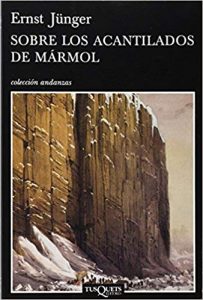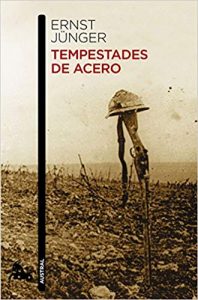When someone is singled out from opposite sides, it is most likely that this person has a more certain truth than either of the other two parties. Things of the tendency to polarization. Criticism of ideological lukewarmness or equidistance, as they say now. And yet, as always, virtue is still in the middle.
One of the most representative cases of this blind pointing is that of the writer Ernst Junger. Possibly his political convictions and his philosophy moved more than those of others when it came time to take sides, back when Hitler was beginning to really scare ... And that Jünger happened to be one of the most referred German nationalists of the moment.
Getting misplaced at the worst moment on a pragmatic level for oneself. When the first earthquakes of World War II arrived, Jünger made his particular exit from the forum. And of course from the left he had always seen him as an enemy and the conservative part contemplated him in his veiled desertion, manifested more than anything in his works until his resignation as an army officer in 1944. In other words, in the end he was stinked by everyone on his own. country.
But this blog is about literature and about that, Jünger also wrote brilliant pages in his novels in addition to other history or essay books.. Steeped in the epic but also dedicated to the mission of recounting the harshness of his time in shadowed Europe, which did not end with one war storm and was already in another, this author complements in some way the great german genius Thomas Mann. It is not that it is at its height, but it does provide that vision in parallel, without reaching the levels of significance of Mann but with that exercise in approaching a war narrative never so close, or some other stories that wonderfully fiction about the politics of those interwar times.
Ernst Jünger's Top 3 Recommended Books
On the marble cliffs
With the passage of time some works acquire the appropriate dimension. And precisely that, an opportunism between magical and precise of the philosopher faced with the mission of predicting the paths of his social and political environment, slides into this allegorical work that points to the dystopia about to materialize.
Published in 1939 at the very beginning of the IIWW, it is presumably that it materialized for quite some time before the war's outcome. It is true that the particular experience of the author in the Great War that had previously bled Europe to death, completed this ability to guess the disaster.
And that the novel itself can be perfectly disguised in its metaphor, in its imprecise location in the country called La Marina. The narrator and those who remain of his family live there after a conflict that ended up separating one from another. Peace, despite the previous war, does not point to a final solution. The threat never ceases from the darkness of the forest near the cliffs, where the Ranger always lurks.
A kind of militia belonging to this Ranger is determined to destroy the inhabitants of La Marina. And seen what has been seen, only the open conflict can put an end to the abuses and crimes of the dictator who came from those dark places covered with giant trees where the light barely penetrates.
Storms of steel
Before the second was the first. And then it was called the Great War. Half Europe saw how its young people perished on a front where factions that united large groups of countries were found.
Among the boys sent to kill or be killed, there was a 19-year-old Ernst who collected experiences finally brought together in 1920 for the pleasure and glory of the most staunch nationalists like Hitler himself.
Ernst then became that kind of reference used by those same nationalists and laid the foundations for his future in the army. Pages stained between the blood of the soldiers and the tint of the epic.
Stories that went through trenches or hospitals. From a somewhat macabre point of view, this book can be seen as an initiatory work for soldiers willing to cling to the ideal of destruction. Although considered from a colder and more analytical aspect, the story is one of the largest samples of literature rather than warfare, of the war itself.
A composition not exempt from the intensity of the author's youth, perhaps capable of idealizing or at least transforming some of the events but always faithful to the final effect of the human disaster.
The ambush
One of those sophisticated essays but in which, once a relaxed reading is undertaken, a transforming intention of the individual is seen.
Having lived through wars and having faced ideologies from different perspectives, Jünger happens to be that fundamental thinker, perhaps along with others like Orwell, towards liberation from dystopia, an aspect of the future that passes through alienation and fear of one's own freedom. In order to be a social individual, human beings need ethical guidelines and references. The problem is who marks them or who knows how to use them for their own benefit.
Unfortunately, the smartest have always been the most ambitious. And the ambition ends up bringing out the worst in each one. Written from the calm after the disaster, among the rubble of defeated Germany and also beaten in its separation between East and West, this call to ambush, who escapes and crouches waiting for the right moment, serves for every moment of submission.
When times are tough. Justifying injustice is not something that difficult to do, it only takes a minimum of hope that you will not be punished again, nor that you will take the place of someone who suffers injustice.



